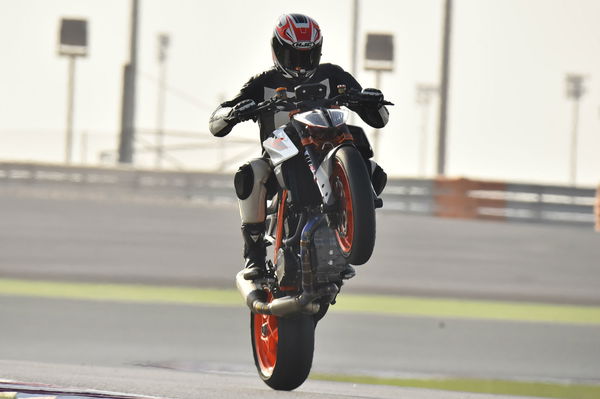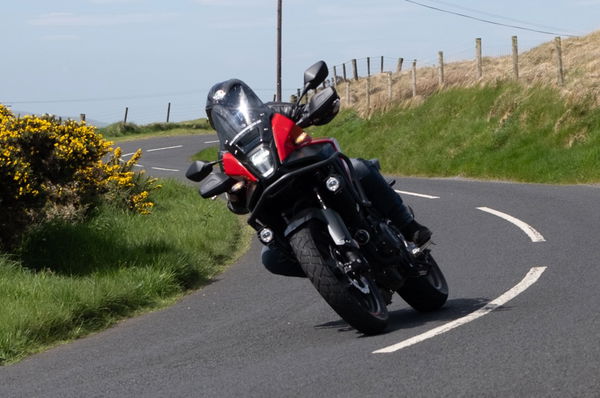First ride: Ducati Multistrada 950 review
The Multi’ for many
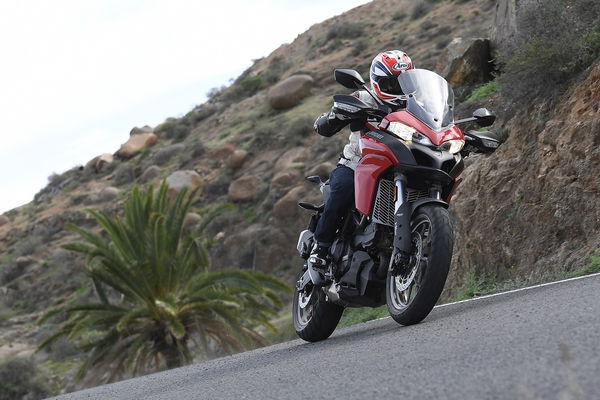
AS I MAKE my way across the interior of Fuertaventura, it’s hard not to imagine riding across another planet. The landscape is arid and the jagged topography broken up by volcanic rubble, thirsty looking plants and me, a flash of red on the latest member of Ducati’s Multistrada family.
Given a big enough ramp, a long run-up and some bigger cojones, I could probably reach another planet on the existing 160hp Multistrada 1200, except the bike I’m riding is the new Multistrada 950 and rather than being powered by the 1198cc Testastretta DVT engine, it’s driven by the 937cc engine used in the Hypermotard 939, but with a dedicated intake system and ECU.
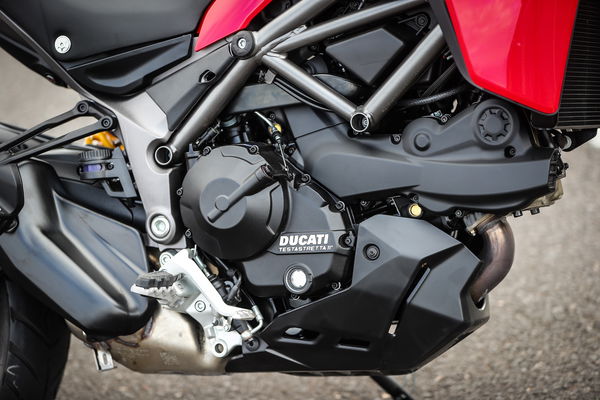
Just because it’s the smallest capacity Multistrada, don’t go thinking that it’s anything like a lesser bike – it’s got a suite of electronics, a crisp info-packed monochrome LCD dash screen derived from the 1200 (that moved around with the lightest of touches), plus fully adjustable suspension at both ends. And if course it looks every bit like it should thanks to the subframe, trellis frame and styling including that beak-y front end (if not the entirety of its bodywork), that it shares with the bigger 1200.
Its geometry is the same too – a good blend of ‘sporting Ducati values and comfort’, says Ducati and I’m inclined to agree. The double-sided swingarm is derived from the unit on the Multistrada 1200 Enduro and means you can fit the accessory spoked wheels if you’re keen enough to take the 950, with its not-that-great ground clearance, on an off-road expedition, where you'll soon be testing the techno-polymer sump guard.
The high-exit silencer is from the Enduro too, although the rest of the exhaust system is unique to this bike. The cast alloy 19 inch front wheel also gives the 950 a bit more in common with the Enduro.
The seat is unique to the 950 and is 840mm high - the lowest in the Multistrada range. I’m 5ft 7” and had to shuffle half an arse cheek off the seat to get a foot flat on the floor but it’s not something that put me off (looking decidely ungainly when paddling it about is more likely to do that) because the balance of the bike is so right and at 204kg dry (or 229kg wet with the 20 litre tank 90% full), its weight is easily manageable.
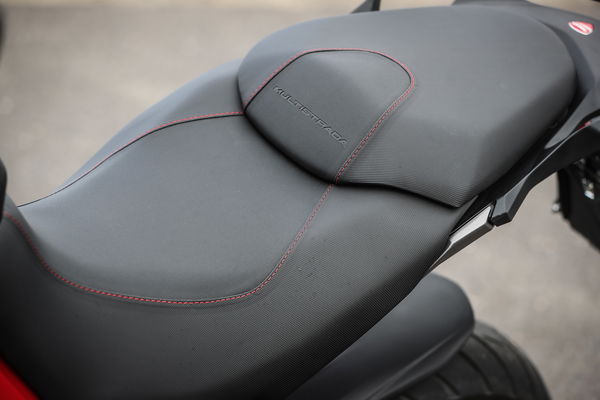
The Multistrada 950’s comfort and ergonomics are the same as the bigger bikes’. It’s a Multistrada, so you should have some idea of what you’re getting: a comfy seat and a natural feeling ride position that works as well for a motorway slog as it does when the roads get a bit more interesting.
Clearly then, the main difference between the Multistrada 950 and the Multistrada 1200 is the engine – this new 950 is the smallest capacity Multistrada, and therein lies its ethos: it’s designed to be the most accessible Multistrada, to appeal to riders who don’t want an all-rounder but not the 160hp of the Multitrada 1200, or the associated costs.
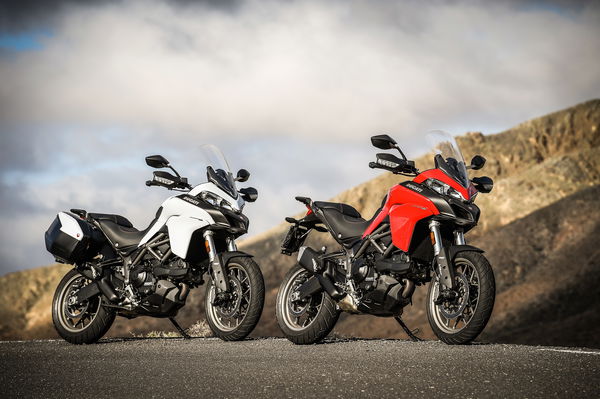
Speaking of which, the Multistrada 950 is £10,995 in red and you’ll have to pay £200 on top of that if you want it in white. That means the red bike is £2,300 cheaper than the standard Multistrada 1200 and £4,900 less than the top-spec 1200 S. It means the 950 is in similar territory to the £10,700 Triumph Tiger Sport (more powerful but heavier) and £10,849 Honda Africa Twin (heavier and less powerful).
Instead of the 160hp of the 1200, the Multistrada 950 makes a much less intimidating 113hp at 9,500rpm and 71lb/ft torque at 7,750rpm. Power is delivered smoothly and without threat. There’s plenty of torquey midrange grunt on offer and 80% of the available torque is delivered between 3,500rpm and 9,500rpm. The engine is flexible and versatile and I often kept it spinning above 6,000rpm means there was always a glob of power very close to hand for easy overtakes and merges.
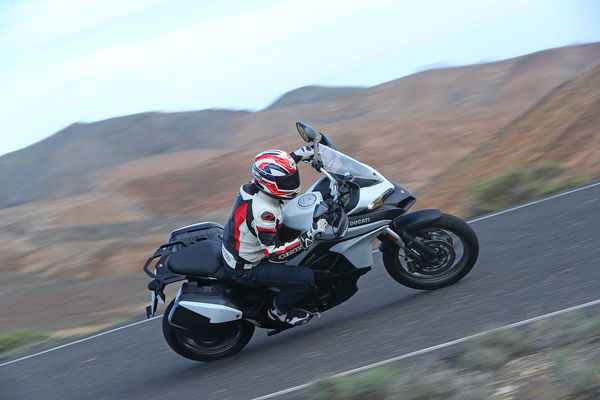
Unless you absolutely must have 160hp available at your greedy right hand, it’s quick enough. Okay, it’s not 160hp-quick but rip the throttle open and it’ll punch forward with gusto, just without leaving you constantly relying on the electronics to help keep the front wheel down and the rear wheel in line.
The engine’s flexibility and accessibility quickly become evident on the road; it’s compliant and easily manageable round town and there’s enough power in store for when the city is receding in your mirrors and you want to press on.
Don’t go thinking that its lower capacity presents a barrier for the kind of country-crossing journeys Multistradas are adept at, or that its power deficit against the bigger Multistradas is indicative of it being somehow less of a Multistrada - that’s not the case. The 950’s engine and power define it in a positive way and the Multistrada 950 is easy to manage, with accessible but engaging power that’s as at home in town as it is being thrapped down a meandering back road or motorway.
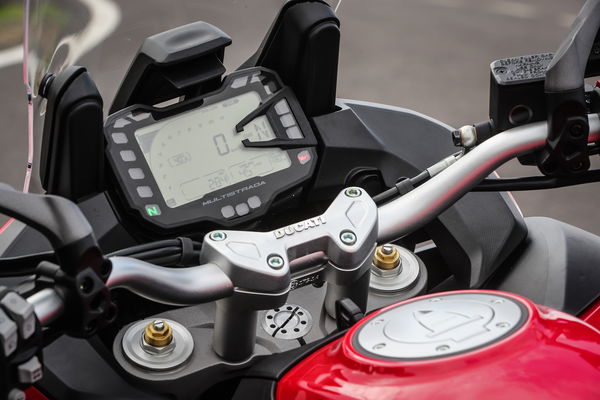
With Ducati’s focus for the Multistrada 950 being on accessibility and versatility, it’ll come as no surprise that it comes with come electronic aids. There are four riding modes – Touring, Sport, Urban and Enduro, plus eight-stage traction control and ABS with three levels of adjustability. Switching between riding modes alters the ABS and traction settings, changes the throttle map and available power. Out of the crate, Touring and Sport both get full power, with Sport having the sharpest throttle map and least amount of traction control. Urban and Enduro both have softened throttle maps and power is cut to 75hp, with increased traction. Enduro mode also deactivates the ABS at the rear wheel. Switching between modes is easily done with the new controls on the left switchgear (the same as on the new Monster 1200 S), all the ride mode settings can be easily customised and the bike will remember them.
After half a morning in Touring mode, I spent most of the day in Sport and quickly favoured the sharper-but-never-jerky throttle response. I left the TC on level 4 and ABS on level 1 and never felt the traction control kicking although got the dash to light up when the front wheel was starting flutter while accelerating hard from a standstill.
THE PIRELLI Scorpion Trail 2 tyres need some credit here too as they gripped Fuertaventura’s abrasive but frequently dusty and occasionally gravelly roads with aplomb. They also did a fine job of cutting through debris on the few occasions I pointed the Multi’ towards a cluster of stones or pile of dust.
On the subject of grip, handling and corner conquering stuff, let’s talk suspension. At the front is a fully-adjustable Kayaba fork with 170mm travel and there’s a fully-adjustable Sachs monoshock in the rear. Apart from a couple of moments gassing it out of corners when I occasionally felt like I needed a little more stiffness in the rear (ooh, who doesn’t, eh?), the rear shock was fine for me.
As standard, the forks gobbled up a lot of their travel when getting on the brakes. They were much too soft for my liking so at the first photo stop, I got a screwdriver wielding man from Ducati to add three clicks more compression damping and half a turn of preload to the front. It made the front feel firmer and more supportive when squeezing the brake lever, but only after the fork has moved through the initial part of its stroke – maybe an inch or two. Still, the suspension worked consistently, I got used to how it felt, and ultimately it didn’t hamper my experience.
In corners, the Multistrada 950 always felt surefooted and stable. I got on the 950 wondering whether I'd prefer a 17 inch front wheel but with its 19-incher, it steered and turned quickly and with stability, even on the one occasion when I entered a tight bend a little too hot and had to yank it round, momentarily getting the left peg to graze the road as I marvelled that my face wasn’t doing the same thing.
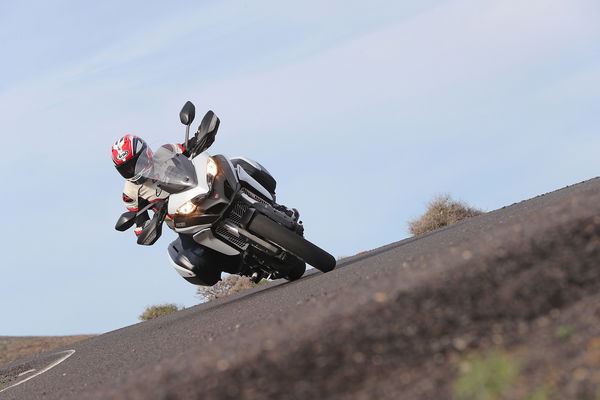
On the subject of pegs: the Multistrada 950 has enduro-style alloy footrests, on top of which sit rubber bungs, which fall out easily. One of mine was gone within an hour and I saw multiple bikes that had either one or both pieces of rubber missing as a result of them being worked lose as riders moved their feet around. As they don’t glue in, it looks like they just don’t have a particularly solid fit into the pegs.
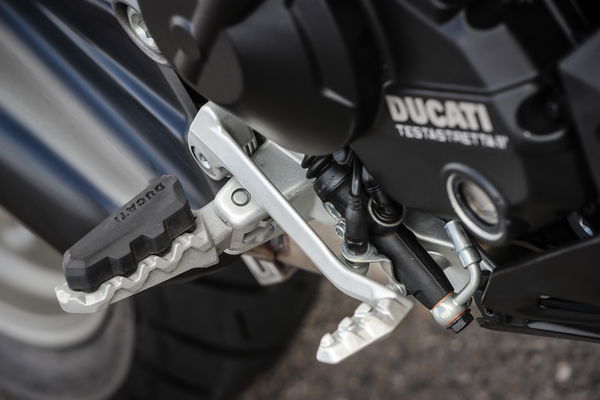
While I’m criticising, I thought the brake and clutch levers looked decidedly cheap. They were the only items that really gave me much of a hint that this bike is the cheapest in the Multistrada range.
When it comes to the brakes themselves, I’ve got no complaints. The two front Brembo M4.32 monobloc four-piston calipers did everything well, with decent progressive power and good feel through the lever as they bit down on the 320mm semi-floating discs. The rear 265mm disc and two-piston caliper is the same setup as on the 1200 Enduro and had good power too and made it easy to do skids in Enduro mode, like the child I am. (Skids are cool).
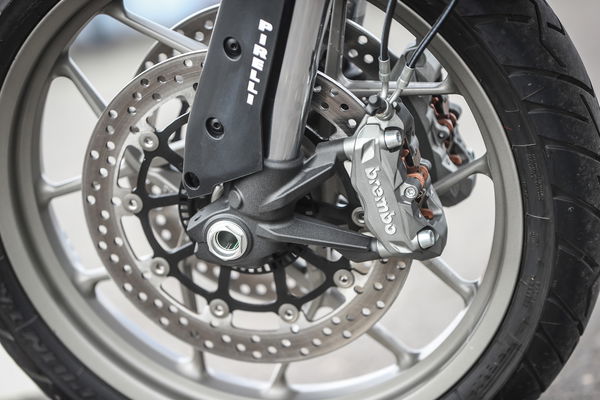
The adjustable screen is excellent. It’s simple to adjust on the move, to whatever height you want, and has a really smooth action. At the highest setting, it came level with the top of my visor and kept by body well shielded from the wind.
So, the new Multistrada 950: it’s not got the skyhook suspension, IMU, the same level of rider aids or the warp speed power of the 1200/1200 S but it's a much more accessible proposition. Its 113hp is less intimidating than the 160hp of the 1200 and makes the 950 a doddle to manage, while still being fast – certainly fast enough for long Euro-trips. It’s also cheaper to buy and will undoubtedly be cheaper to run and insure, so unless you really need all that tech and power, the Multistrada 950 is the all-rounder from Ducati that’s going to suit most people, most of the time.
Tested: Ducati Multistrada 950
Price: £10,995 (red) or £11,195 (white)
Engine: 937cc Testastretta four-valve liquid-cooled L-twin
Power: 113hp at 9,000rpm
Torque: 71lb/ft at7,750rpm
Suspension: Front – Fully-adjustable Kayaba USD fork / Rear – Full-adjustable Sachs monoshock
Brakes: Front – Twin Brembo M4.32 four-piston monobloc calipers with 320mm semi-floating discs / Rear – Two-piston floating caliper and 265mm disc
Weight: 229kg (wet, tank 90% full)
Tank capacity: 20 litres
Seat height: 840mm
